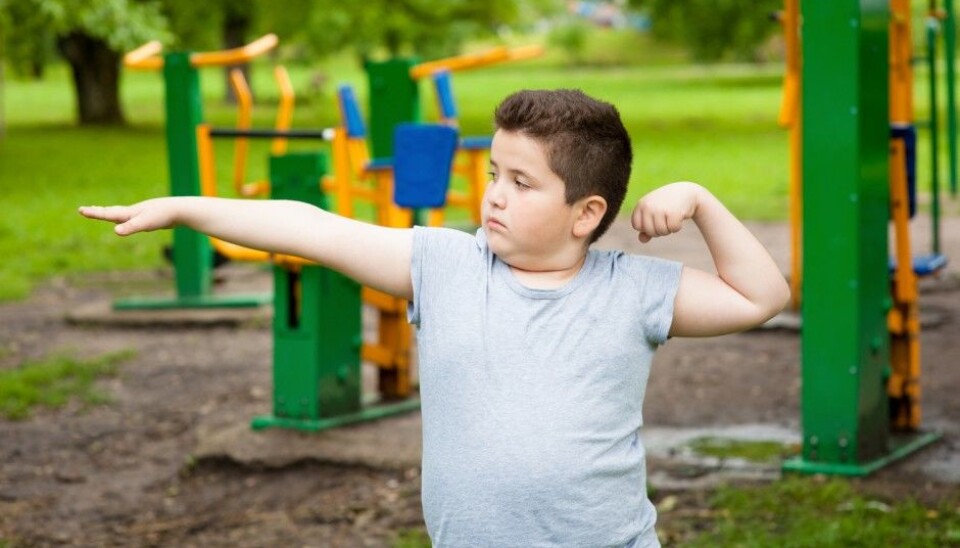
School programme tackling child obesity had no effect
A big experimental programme tested out activities that would encourage students to eat healthier and be more active. It had no effect.
Recent research has shown that childhood obesity is difficult to treat. Many health initiatives have used schools as the channel to implement preventive measures.
“Kindergartens, schools and after-school activities are places where children spend a lot of their childhood. These institutions play an important role in contributing to good lifestyle habits by facilitating varied physical activity and good dietary habits," writes Norway’s Directorate of Health in its 2010 guidelines.
Some studies have shown a beneficial effect from school-based programmes.
But recently, the research journal BMJ published the results of a major experiment with well over 1000 six and seven year olds in over 50 UK schools. It shows the school programme had absolutely no effect.
Ulf Ekelund, professor at the Norwegian School of Sport Sciences and one of the researchers behind the study, doesn’t hide his disappointment.
"Obviously when we started, we were hoping for some effect, that’s why we do programmes like this,” he says.
Multicomponent approach
The programme was based on indications from previous research on what could work.
Ekelund and his colleagues had put together a program designed to motivate for better diet and more physical activity. It included both training and practical components, such as cooking courses for the students' families and school-run physical activities, both during and after school.
The programme was specifically aimed at weak groups who started out with an increased risk of obesity.
The activities took place over 12 months. Researchers registered all the pupils’ BMI at 15 and 30 months after start-up. They also measured a number of other factors, such as diet and the amount of physical activity, from a sampling of the student participants.
Then the researchers compared the results from schools that had run the programme and the schools that hadn’t.
No effect
The results showed no difference either on students’ BMI or any other factors.
"This corresponds to a similar study that was recently published," says Ekelund, who emphasizes that it is also important to publish negative results.
The study he refers to was published in the journal The Lancet Child & Adolescent Health in January 2018.
"I think our results show that it’s very difficult to influence childhood obesity solely through school-based activities," he says, but he stresses that increased physical activity in children’s school life is likely to have many other positive effects.
Research on implementation needed
Ane Kokkvoll researches the treatment of obesity in children and currently works at the University of Alberta in Canada. She thinks the new study is good, but that the results should be interpreted with caution.
"It would be unfortunate if, on the basis of the conclusion in this single study, we perceive school-based interventions as ineffective," she writes in an email to forskning.no.
The survey done by Ekelund and his colleagues may also have weaknesses. Which part of the population the programme is being tested on can make a big difference, for example, Kokkvoll says.
She adds that obesity in children is a result of biological, genetic and environmental factors that are unevenly distributed. “Preventive measures should focus on children who are at risk for overweight or obesity. It doesn’t make sense to expect weight loss in mostly normal-weight children.”
Kokkvoll mentions that some critics have suggested that the programme wasn’t followed as it was designed to be.
"Failure to implement and support the offer of physical activity could explain the lack of increased physical activity we see in the children," she writes.
In Kokkvoll’s opinion, this study illustrates the need for research on implementation. What is feasible and how can we recruit participants so that the most vulnerable groups join?
Ekelund believes that the lack of effect could be due to the fact that many other factors affect obesity, especially the family. The school may simply not have any impact on food traditions and habits in the family.
Diet and obesity link not so simple
A Norwegian study published in 2017 shows that overweight children who eat a reasonable Norwegian diet and are much more active often become normal-weight adults later.
But all in all, little research shows that overweight children eat more unhealthy food than normal weight children do. Several studies, such as a Norwegian one published in 2010, have shown the opposite: overweight children ate less junk food than their normal-weight counterparts.
Many of these studies are based on surveys and self-reporting, and the results may thus be somewhat unreliable. Some studies have suggested that people with overweight or obesity underestimate how much they eat more often than others.
Nevertheless, the lack of clear trends may indicate that the relationship between diet and obesity is not as simple as we think.
Nor is the effect of physical activity clear.
Obesity causes inactivity
Several studies indicate that children with overweight and obesity are less active than normal, but it’s often difficult to say whether they are overweight because they’re inactive or if they are more sedentary because they’re overweight.
Several other school intervention studies have also concluded that school programmes have little effect on physical activity, says Ekelund.
He has done a lot of research on the connection between sedentary time, physical activity and obesity. His results don’t support the assumption that a lack of physical activity leads to obesity.
"The level of physical activity can’t predict who will develop obesity, either in adults or children. On the other hand, we are seeing that if a person is overweight, it increases their risk of doing less physical activity,” Ekelund says, referring to a study published in the International Journal of Obesity in 2017.
Have to look at the results
In a BMJ editorial, Melissa Wake of The University of Melbourne describes information campaigns as ineffective.
She cites Winston Churchill: "However beautiful the strategy, you should occasionally look at the results." The text goes on to comment on the discouraging findings in Ekelund’s survey.
Wake found the researchers’ multicomponent intervention to be “the embodiment of good sense” and the study itself to exemplify thorough research work.
Null results can be influential, she writes, and studies like this one can help to avoid implementing or maintaining ineffective measures.
Wake concludes, “It is time to step back, take stock, carefully examine longitudinal data from contemporary children, and generate new… approaches that could maximize health gain and be rigorously and speedily tested.”
She is clear that that what we shouldn’t do is repeat the same thing over and over again and expect different results.
-------------------------------------
Read the Norwegian version of this article at forskning.no.
Scientific links
- Peymane Adab et al., Effectiveness of a childhood obesity prevention programme delivered through schools, targeting 6 and 7 year olds: cluster randomised controlled trial (WAVES study), BMJ, 2018.
- Melissa Wake, The failure of anti-obesity programmes in schools Null results are important, and a strong signal to try something else, BMJ, 2018.

































